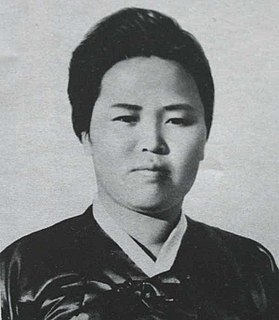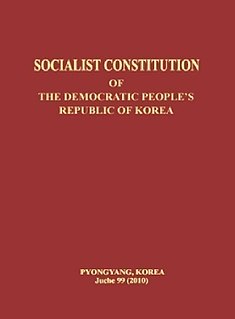
Kim Jong-il was the second leader of North Korea. He ruled from the death of his father Kim Il-sung, the first leader of North Korea in 1994 until his own death in 2011.

Juche is the official state ideology of North Korea, described by the government as "Kim Il-sung's original, brilliant and revolutionary contribution to national and international thought". It postulates that "man is the master of his destiny", that the Korean masses are to act as the "masters of the revolution and construction" and that by becoming self-reliant and strong, a nation can achieve true socialism.

The contemporary culture of North Korea is based on traditional Korean culture, but developed since the establishment of the Democratic People's Republic in 1948.

Pulgasari is a 1985 North Korean dark fantasy-action monster film directed by Shin Sang-ok and Chong Gon Jo. The film starred Chang Son Hui and Pak Sung Ho and featured special effects by Duk Ho Kim, supervised by Teruyoshi Nakano. The film was loosely based on the legend of the Bulgasari.

Kim Jong-suk was a Korean anti-Japanese guerrilla, a Communist activist, North Korean leader Kim Il-sung's second wife, former leader Kim Jong-il's mother, and current leader Kim Jong-un's grandmother.

Shin Sang-ok was a South Korean film producer and director with more than 100 producer and 70 director credits to his name. His best-known films were made in the 1950s and 60s when he was known as The Prince of South Korean Cinema. He received the Gold Crown Cultural Medal, the country's top honor for an artist. He is also known for having been kidnapped by the late North Korean leader, Kim Jong-il, for the purpose of producing critically acclaimed films. He was born Shin Tae-seo; he later changed his name to Shin Sang-ok when he started working in the film industry.

The cinema of North Korea began with the division of Korea and has been sustained since then by the ruling Kim dynasty. Kim Il-Sung and his successor Kim Jong-Il were both cinephiles and sought to produce propaganda films based on the Juche ideology.

The Socialist Constitution of the Democratic People's Republic of Korea is the constitution of North Korea. It was approved by the 6th Supreme People's Assembly at its first session on 27 December 1972, and has been amended and supplemented in 1998, 2009, 2012, 2013, 2016 and 2019. It replaced the country's first constitution which was approved in 1948.

Kim Jong-un is a North Korean politician who has been the supreme leader of North Korea since 2011 and chairman of the Workers' Party of Korea since 2012. He is the second child of Kim Jong-il (1941–2011), who was North Korea's second leader from 1994 to 2011, and Ko Yong-hui (1952–2004). He is the grandson of Kim Il-sung, who was the founder and led North Korea from its establishment in 1948 until his death in 1994.

Kim Sŏng-ae was a North Korean politician who served as the First Lady of North Korea from 1963 to 1974. She was the third wife of the President of North Korea, Kim Il-sung.

The Workers' Party of Korea (WPK) is the founding and ruling political party of North Korea. It is the largest party represented in the Supreme People's Assembly and coexists de jure with two other legal parties making up the Democratic Front for the Reunification of the Fatherland. However, these minor parties are completely subservient to the WPK, and must accept the WPK's "leading role" as a condition of their existence.

The Chollima Movement (Korean: 천리마운동) was a state-sponsored Stakhanovite movement in North Korea intended to promote rapid economic development. Launched in 1956 or 1958, the movement emphasized "ideological incentives to work harder" and the personal guidance of Kim Il-sung rather than rational modes of economic management.

Propaganda is widely used and produced by the government of North Korea. Most propaganda is based on the Juche ideology and on the promotion of the Workers' Party of Korea. The first syllable, "ju", means "the main or fundamental" principle; the second syllable, "che", means body or self or the foundation of something — the same as the Chinese word "ti" in the famous phrase, "Chinese learning for the foundation and European learning for application." Article 3 of the Socialist Constitution proclaims, "The DPRK is guided in its activities by the Juche idea, a world out-look centered on people, a revolutionary ideology for achieving the independence of the masses of people."

Korean revolutionary opera is a tradition of revolutionary opera in North Korea based on that of China during the Cultural Revolution. It is characterized by a highly melodramatic style and reoccurring themes of patriotism and glorification of Juche, President Kim Il Sung, and the working people, as well as a focus on socialist realist themes. Composers of North Korean revolutionary opera are employed by the North Korean government and the fundamental principles of North Korean revolutionary opera were dictated by Kim Jong-Il in his speech On the Art of Opera.

The North Korean cult of personality surrounding its ruling family, the Kim family, has existed in North Korea for decades and can be found in many examples of North Korean culture. Although not acknowledged by the North Korean government, many defectors and Western visitors state there are often stiff penalties for those who criticize or do not show "proper" respect for the regime. The personality cult began soon after Kim Il-sung took power in 1948, and was greatly expanded after his death in 1994.

Ten Principles for the Establishment of a Monolithic Ideological System are a set of ten principles and sixty-five clauses which is used to establish standards for governance and guide the behaviors of the people of North Korea.

On the Art of the Cinema is a 1973 treatise by the North Korean leader Kim Jong-il. It is considered the most authoritative work on North Korean filmmaking.
The abduction of Shin Sang-ok and Choi Eun-hee occurred in North Korea between 1978 and 1986. Shin Sang-ok was a famous South Korean film director married to actress Choi Eun-hee. Together, they established Shin Film and made many films through the 1960s which garnered recognition for South Korea at various film festivals. In 1978 Choi was abducted and taken to North Korea to meet North Korea's soon-to-be dictator Kim Jong-il. The abduction of Shin followed six months later.
Choe Ik-gyu, also known under the pseudonym Choe Sang-gun, is a North Korean film director, propagandist, and politician.

Let Us March Forward Dynamically Towards Final Victory, Holding Higher the Banner of Songun is a speech by Kim Jong-un on 15 April 2012, given to commemorate the centenary of the birth of Kim Il-sung. It was his first major public speech after succeeding his father Kim Jong-il after his death in 2011. He had given at least one speech, Let Us Brilliantly Accomplish the Revolutionary Cause of Juche, Holding Kim Jong Il in High Esteem as the Eternal General Secretary of Our Party, to party officials the week before.



















